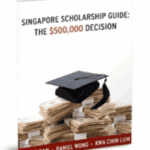Is applying for a scholarship the logical next step?
So you've always done pretty well in school. Is applying for a scholarship the logical next step for you?
Ailian Gan, Daniel Wong and Kwa Chin Lum, co-authors of “Singapore Scholarship Guide: The $500,000 Decision” dealt with this issue in their book. Read on to find out what they have got to say.
Daniel:
If you’re currently in a position to apply for a scholarship, chances are that you’ve done consistently well over the course of your academic career. It’s easy to become obsessed about climbing the ladder faster.
How do I get to the top as quickly as possible? What ladder-climbing technique should I use?
But this is the more important question you need to ask yourself: Is the ladder leaning against the right wall?
Take some time to think about your motivations in applying for a scholarship. For me, I’ll be honest and say that I was partially motivated by the “prestige” factor and the desire to live up to other people’s expectations.
I now recognise that these aren’t at all the right reasons to apply for a scholarship!
If you do apply for one, make sure that your primary motivation is your interest in serving the organisation that will sponsor your education.
It may seem to you as if getting a scholarship is the pinnacle of academic achievement, but it really isn’t. It’s just one possible option, so don’t assume that it’s the logical next step.
There are many other paths you can take.
Ailian:
Figuring out what's next is the next step.
I think one of the difficulties with doing well within the Singaporean school system is that you become used to having goals and, by extension, having success defined for you.
Good grades, awards, club leadership positions. You're used to seeing one set path, one right track to take. But the reality is that careers are less like following a road and more like navigating an ocean.
I think one of the big secrets is that you don't have to do anything in life, no matter how much pressure you feel. You don't have to go to university or get out of bed or do well in school or spend time with your friends.
All these are choices.
You need to make choices and take responsibility for the consequences. Based on this line of thinking, you’re likely to conclude that there are significant benefits to going to university and getting out of bed.
But you don't need to apply for a scholarship any more than you need to, say, study chemistry. For some people it makes perfect sense (studying chemistry makes sense if you want to be a doctor), but for many others, it doesn't make sense at all.
Chin Lum:
It could seem that way, especially when all of your friends are beginning to apply for scholarships, and they already know which is their top choice.
But there are some questions you should ask yourself first:
- What course of study am I interested in?
- Do I want to study overseas?
- Which organisations am I interested in working for?
- What kind of career do I want?
- How badly do I want a scholarship?
- Do I even know what a scholarship entails?
Once you’ve thought about these questions, it will be easier for you to decide whether you should take up a scholarship. Speaking to people who have walked the journey before you will help you a lot in figuring out what you want.
Some people are able to make the scholarship decision quickly, while others take longer. It’s okay to be one of those in the latter group (but don’t use this as an excuse to procrastinate!).
In the meantime, go for tea sessions and find out more. You could also start thinking about how you might respond to some of the application essays that you’ll have to write—it’s an interesting process of self-discovery, which could help you decide whether the scholarship is for you.
Don’t restrict your options too early, whether it’s taking up a scholarship or not applying for one at all.
Reproduced with permission from “Singapore Scholarship Guide: The $500,000 Decision”
Last Updated on 16 September 2024
Daniel Wong is the bestselling author of The Happy Student: 5 Steps to Academic Fulfilment and Success. He specialises in empowering students to become both happy and successful. He has spoken to and worked with more than 20,000 students, parents and educators in countries like the United States, Indonesia and Singapore.





